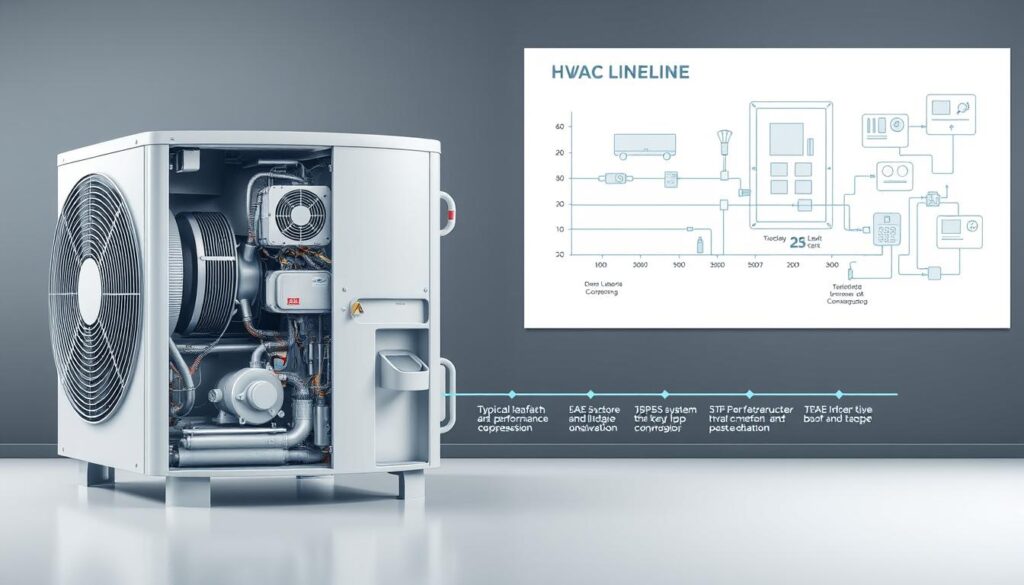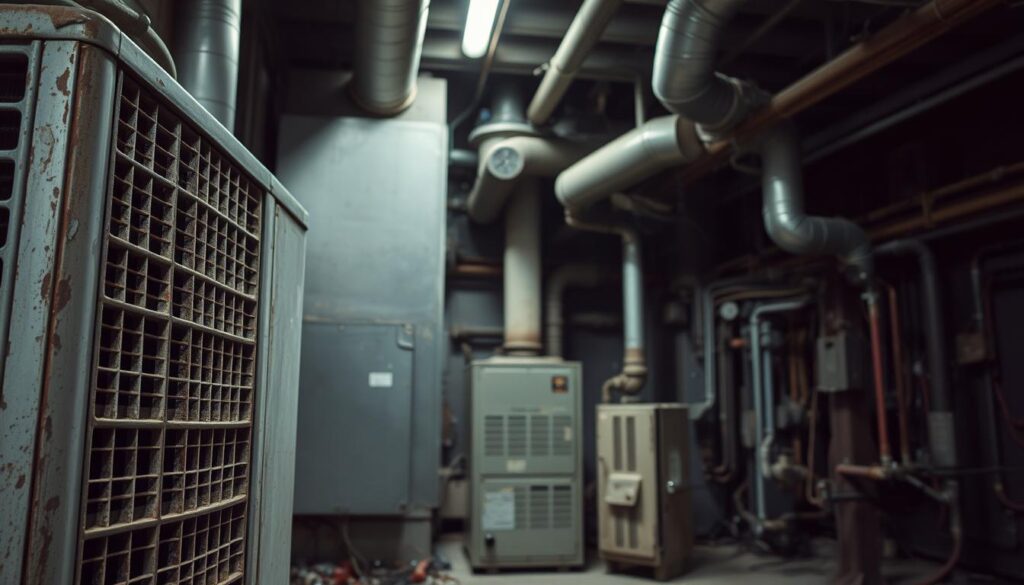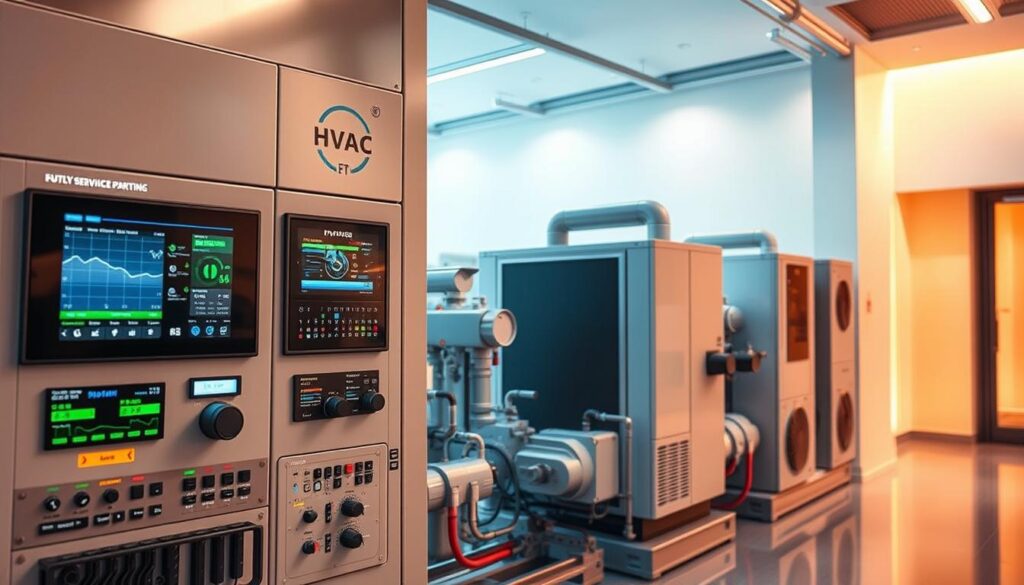Affiliate Disclosure
HVAC Guide Guys is a participant in the Amazon Services LLC Associates Program, an affiliate advertising program designed to provide a means for sites to earn advertising fees by advertising and linking to Amazon.
How Many Years HVAC Last? Ever thought about how long your HVAC system will last? Knowing its lifespan can save you a lot of money. It’s like knowing how long your favorite home appliance will stick around.

HVAC systems are big investments that usually last 10 to 20 years. How long they last depends on a few key things. These include how well you maintain it, the quality of its installation, and the environment it’s in.
Thanks to new technologies, HVAC systems are more reliable than ever. They provide better cooling and heating for your home.
Understanding how long your HVAC system will last helps you plan. It also helps you budget for when you might need a new one. Different parts of your system have different lifespans. So, some parts might need more attention sooner than others.
Key Takeaways
- Average HVAC lifespan ranges from 10-20 years
- Regular maintenance significantly extends system durability
- Different HVAC components have unique longevity timelines
- Installation quality directly impacts system performance
- Environmental factors play a critical role in HVAC system health
Table of Contents
Understanding HVAC System Longevity Basics
Your HVAC system is key to home comfort and saving energy. Knowing how long it lasts helps you plan for future needs.
Different HVAC systems last for various times, based on several factors. Knowing this helps you make smart choices for your home’s heating and cooling.
Types of HVAC Systems and Their Lifespans
- Central Air Conditioning Units: 12-17 years
- Heat Pumps: 10-16 years
- Furnaces and Boilers: 15-20 years
- Geothermal Heat Pumps: 25-30 years
- Solar HVAC Systems: 25-30 years
- Evaporative Coolers: 5-15 years
Critical Factors Impacting System Duration
How long your HVAC system lasts isn’t just about age. Several important factors affect its lifespan:
| Factor | Impact on Longevity |
|---|---|
| Maintenance Quality | Regular service can extend system life by 3-5 years |
| Installation Precision | Professional installation reduces premature wear |
| Environmental Conditions | Extreme climates accelerate system degradation |
“Proper maintenance is the key to maximizing your HVAC system’s lifespan.” – HVAC Industry Expert
Understanding these factors helps you protect your investment and plan for future replacements wisely.
Explore Our HVAC Shop
Looking for top-rated HVAC tools, parts, and accessories? Visit our shop and find the perfect solution for your needs.
Visit the ShopHow Many Years HVAC Last: A Comprehensive Timeline
Knowing how long your HVAC equipment lasts is key to keeping your home comfy and saving money in the long run. Most HVAC units last between 15 to 20 years. But, this can change a lot based on several important factors.
Your HVAC system goes through different stages as it ages:
- Initial Years (0-5 years): Peak efficiency and minimal repair needs
- Middle Years (6-10 years): Consistent performance with routine maintenance
- Later Years (11-15 years): Gradual efficiency decline and increased repair frequency
- Final Years (16-20 years): Higher risk of system failure and reduced energy efficiency
The lifespan of your HVAC equipment depends on things like how well it was installed, how often it’s maintained, and the environment it’s in. Homeowners should keep an eye on their system’s performance and plan for replacements when needed.
Regular professional inspections can help extend your HVAC system’s durability and predict possible issues before they become expensive problems.
Different parts of your HVAC system may last longer or shorter than others. For example, compressors might need to be replaced sooner, but well-kept heat exchangers can last the whole system’s life. Keeping track of these milestones helps you make smart choices about repairs and replacements.
Key Factors Affecting Your HVAC System’s Durability
Your HVAC system’s lifespan depends on many important factors. These factors can greatly affect its performance and how long it lasts. Knowing these helps you get the most out of your system and know when to replace it.
Several key elements play a big role in how long your HVAC system works well. Let’s look at what affects your system’s durability.
Installation Quality Matters
The way your HVAC system is installed is very important. A bad installation can shorten its lifespan and cause it to fail early.
- Professional installation ensures proper sizing
- Correct equipment selection prevents unnecessary strain
- Precise ductwork installation minimizes energy losses
Environmental Challenges
Your local climate and environment can really affect your HVAC system. Extreme temperatures, humidity, and air quality can make it wear out faster.
- Coastal areas with salt air cause faster corrosion
- High humidity regions increase system stress
- Dusty environments require more frequent maintenance
Usage Patterns and Intensity
How you use your HVAC system affects its lifespan. Using it consistently and moderately helps keep it in better shape than using it too much or too little.
Consistent maintenance is key to extending your HVAC system’s operational life.
Understanding these factors helps you protect your HVAC investment. It also helps you keep it running well for as long as possible.
Explore Our HVAC Shop
Looking for top-rated HVAC tools, parts, and accessories? Visit our shop and find the perfect solution for your needs.
Visit the ShopSigns Your HVAC System Is Reaching End of Life

Spotting the signs of a failing HVAC system can prevent sudden breakdowns and expensive fixes. Knowing when your system needs a replacement is key to its longevity.
As your HVAC system nears the end of its life, look out for these key signs:
- Frequent Repairs: If repair costs are close to half the price of a new system, it’s time to think about replacing it.
- Rising Energy Bills: Unexpected jumps in your energy bills can mean your system is losing efficiency.
- Inconsistent Temperatures: If some rooms are much colder or warmer than others, it’s a sign your system is failing.
- Unusual Noises: Grinding, squealing, or banging sounds are clear warnings that your system might fail soon.
Your HVAC system often shows its age through changes in how it works. Paying attention to these signs can help you plan a replacement before it’s too late.
| Warning Sign | Potential System Age Impact |
|---|---|
| Repair Frequency | Indicates system past 10-15 years |
| Energy Efficiency Drop | Suggests significant performance decline |
| Strange Sounds/Odors | Critical signal of imminent system failure |
“An informed homeowner is a proactive homeowner. Recognizing these signs early can prevent costly emergency replacements.” – HVAC Professional Insight
Don’t wait until your HVAC system completely fails. Keep an eye on its performance and know these warning signs to make the right choice about repair or replacement.
Essential Maintenance Practices for Extended HVAC Life
Keeping your HVAC system in top shape is key. Regular care can make it last longer than expected. Your efforts directly affect your system’s health and performance.
Smart homeowners know that regular maintenance saves money and keeps systems running well. The right maintenance plan can extend your HVAC’s life, saving you from expensive repairs.
Regular Service Schedules
Having a set maintenance schedule is vital for your system’s health. Experts suggest:
- Bi-annual professional inspections
- Quarterly filter replacements
- Annual deep cleaning of system components
Professional vs DIY Maintenance Tasks
Knowing what you can do yourself and what needs a pro is important. It keeps your system running smoothly.
| DIY Tasks | Professional Tasks |
|---|---|
| Changing air filters | Refrigerant level checks |
| Cleaning external units | Electrical system diagnostics |
| Checking thermostat settings | Complex mechanical repairs |
Seasonal Maintenance Checklist
Each season brings its own maintenance needs to keep your HVAC system running well:
- Spring: Clean outdoor units, check refrigerant levels
- Summer: Ensure proper airflow, inspect ductwork
- Fall: Prepare heating systems, seal air leaks
- Winter: Lubricate parts, check insulation
“Consistent maintenance is the key to maximizing your HVAC system’s lifespan and performance.” – HVAC Industry Expert
Explore Our HVAC Shop
Looking for top-rated HVAC tools, parts, and accessories? Visit our shop and find the perfect solution for your needs.
Visit the ShopEnergy Efficiency and System Longevity Connection
Your HVAC system’s energy efficiency is key to its lifespan. Modern systems with advanced tech can last longer than old ones. They reduce wear and tear, making your system last longer.
Energy-efficient HVAC systems bring big benefits. They improve your system’s performance and lifespan:
- Reduced mechanical stress on components
- Lower operational temperatures
- Minimized energy consumption
- Decreased environmental impact
When thinking about when to replace your HVAC, energy efficiency matters a lot. High-efficiency systems have:
- Variable-speed compressors
- Smart thermostat integration
- Advanced filtration systems
- Improved heat exchange mechanisms
Choosing an energy-efficient HVAC system saves money in the long run. It means fewer repairs and a longer system life.
| Efficiency Rating | Potential Lifespan Extension | Energy Savings |
|---|---|---|
| Standard Efficiency | 10-15 years | baseline |
| High Efficiency | 15-20 years | 20-30% reduction |
| Premium Efficiency | 20-25 years | 30-40% reduction |
Choosing energy efficiency saves you money and supports a sustainable system. It’s good for your comfort and the planet.
Cost Considerations: Repair vs Replace Decision Making
Choosing between repairing or replacing your HVAC system is tough. It’s important to know the costs to keep your home comfy and your wallet happy. The best choice can extend your HVAC’s life and save you money.
Many homeowners face a dilemma with old HVAC systems. But, there are clear guidelines to help you decide wisely.
The $5,000 Rule: A Financial Decision-Making Tool
The $5,000 rule is a simple way to decide. Here’s how it works:
- Multiply your HVAC’s age by the repair cost
- If it’s over $5,000, it’s usually better to replace it
- Think about your system’s efficiency and energy savings
Long-Term Financial Impact Analysis
When looking at replacement costs, consider these important factors:
| Consideration | Repair Costs | Replacement Costs |
|---|---|---|
| Initial Investment | Lower | Higher |
| Energy Efficiency | Decreasing | Improving |
| Potential Savings | Minimal | Significant |
Your choice should weigh immediate costs against long-term savings. New HVAC systems save on energy bills and boost your home’s value.
Smart homeowners see HVAC replacement as an investment, not just an expense.
Getting a professional’s opinion is the best way to figure out what’s best for your HVAC system.
Explore Our HVAC Shop
Looking for top-rated HVAC tools, parts, and accessories? Visit our shop and find the perfect solution for your needs.
Visit the ShopModern HVAC Technologies and Lifespan Improvements

Technology is changing the HVAC world, making systems last longer and work better. Today’s systems have new features that make them more durable and efficient.
Smart tech is also changing how often you need to replace your HVAC unit. New innovations give you more control and save energy:
- Variable-speed motors that adjust to temperature changes
- AI-powered smart thermostats that send maintenance alerts
- Improved refrigerant systems that are better for the environment
These new technologies bring many benefits. Intelligent monitoring can spot problems early, saving you from expensive fixes. This can add years to your system’s life.
New trends like zoned cooling, IoT, and self-checking are expanding what HVAC systems can do. Choosing modern tech means better, longer-lasting comfort for your home.
The future of HVAC is smart, efficient, and adaptive.
By using these new technologies, you’re not just updating your HVAC. You’re making your home more sustainable and comfortable.
Conclusion
Knowing how long your HVAC system lasts is key to a cozy home. You’ve learned that each system’s lifespan varies. This depends on how well it’s maintained, installed, and the environment it’s in. Taking care of your system can make it last longer.
Regular upkeep is a must, not just a suggestion. Getting your system checked by pros, changing filters, and fixing small problems can save you a lot. Watch out for signs like uneven temperatures, strange noises, or high energy bills. These signs mean it’s time to think about repairs or a new system.
Your HVAC system is a big investment in your home’s comfort. By following the tips from this article, you can make it work better and last longer. Every system is different, so knowing what it needs is important. This helps you keep it running smoothly and avoid unexpected costs.
Start taking care of your HVAC system now. Check how it’s doing, look at its maintenance history, and plan ahead. You’ll save money and time in the long run with good maintenance.

